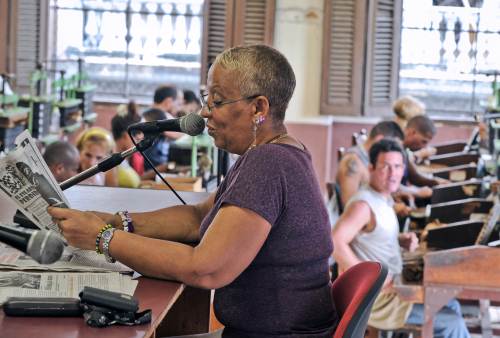HAVANA (AFP) ― Perched on a wooden dais in front of 600 workers rolling Cuba’s legendary cigars, Grisel reads aloud ― poems, novels and even sex tips from the newspaper ― keeping workers entertained, their attention rapt, just the way it has been done for 150 years.
Grisel, 55, a petite former teacher who wears reading glasses she adjusts frequently, may have a job that predates electricity.
 |
Cuban cigar factory reader Grisel Valdez reads the newspaper to cigar rollers on July 12 at H. Upmann Cigar Factory in Havana. (AFP-Yonhap News) |
But nobody in Cuba seems to have any interest in replacing her with a transistor radio or TV.
Indeed, she prides her old-school duties for its content and delivery ― in a range of voices (a different one for each character) when reading a novel, for example ― as well as careful preparation before her sessions.
She chats with workers between reading stints to get feedback and take requests.
She is one of about 300 of cigar factory “readers” who have been brightening the long and monotonous work day of cigar rollers for over a century and a half.
To some the tradition is so unique and valuable that UN Educational Scientific and Cultural Organization has proposed including it as part of mankind’s intangible patrimony.
Most workers spend 10 hours rolling, clipping and trimming tobacco with a few simple tools, for under 20 dollars a month.
They often start out a day with selections from the Communist party newspaper, and then veer into poems almost universally loved ― such as Pablo Neruda’s love poems ― and classic novels like “The Count of Monte Cristo.”
“The reader is extremely important for us. Because she broadens our cultural horizons,” said Julia Curbera, deftly handling the leaves with the ease of someone who has been making the same movements for 30 of her 47 years, on a banged up table that looks like a 19th century schoolhouse desk.
On this day, Grisel’s sweet and reassuring voice echoes through the H. Upmann building in Centro Habana, where the world-class Montecristo brand is made, reading out headlines about Venezuelan President Hugo Chavez, the national mango harvest and government calls on workers to boost their productivity.
“A lot of us did not get past ninth grade (early secondary school) so this helps us to improve ourselves and stay up on the news, because we are here for 10 hours without knowing what is happening in the outside world,” explained Irse Martinez, who has 16 years of cigar rolling under his belt.








![[Today’s K-pop] Blackpink’s Jennie, Lisa invited to Coachella as solo acts](http://res.heraldm.com/phpwas/restmb_idxmake.php?idx=644&simg=/content/image/2024/11/21/20241121050099_0.jpg)